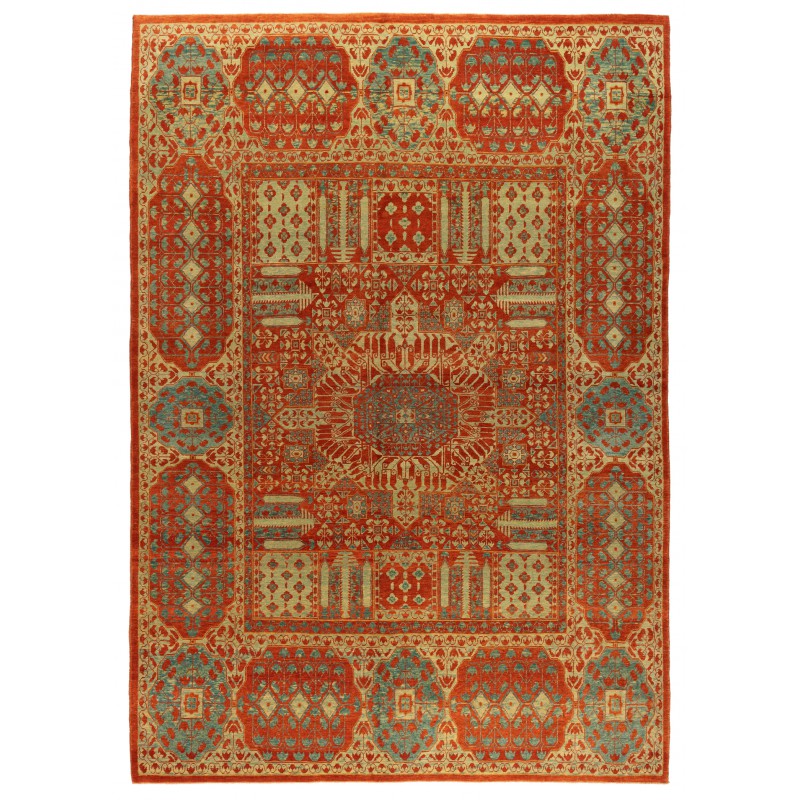
- Stock: 売り切れ
- Model: C40071
- サイズ: 198cm x 316cm
この絨毯の情報は、Esin Atil著『ルネサンス・オブ・イスラム、マムルークのアート』、1981年、スミソニアン博物館出版局、ワシントンD.C.の第126号から引用されました。このヤシの木とヒノキのある絨毯は、エジプトのカイロのマムルークスルタンによって15世紀末にデザインされました。現在、ワシントンD.C.のテキスタイル博物館で展示されています(R.16.1.3)。中央の正方形には、八の倍数に基づいた幾何学的なパターンの究極の表現があります。中央の八角形は地面に赤いランセットの葉で埋め尽くされています。中心には、八角形のメダリオンで囲まれた多くの花びらのつぼみがあります。八芒星で囲まれたメダリオンの周りには、八角形を変形させる三角形が配置されています。それらは地面にパピルスの飾りがあります。このゾーンを囲むように、バラの花を持つ多角形のシリーズがあり、巨大な十六芒星を形成しています。中央の正方形の隅には、地面に四葉のクローバーがあります。中央の正方形の上下には、ヤシの木とヒノキが交互に配置され、中心に向かって配置されたパピルスの飾りに囲まれています。フレームは、交互に配置された楕円形のカルトゥーシュと八裂メダリオンで密に埋め尽くされています。これらのユニットには、楕円形の中央部から進化したパピルスのモチーフが詰まっており、また、多くの花びらのつぼみが詰まったメダリオンの中の四角形から放射状に広がっています。長辺の中央部の楕円形は狭くなり、菱形だけが含まれています。葉の巻き飾りで飾られた二重のガードボーダーが、カラースキームを繰り返しています。この絨毯には、他の同時代の芸術で使用されている多くの装飾要素が含まれています。横断帯に生える写実的なヒノキは、金属製品やタイル、そして1472-74年に完成したスルタン・カイトベイの霊廟のステンドグラスの窓に見られるものと似ています。この絨毯のデザインは、デザイナーによって解釈され、やわらかい色が選ばれました。
The source of the rug comes from the book Renaissance of Islam, Art of the Mamluks, Esin Atil, Smithsonian Institution Press, Washington D.C., 1981 nr.126. This rug with palm trees and cypresses was designed in the late 15th-century rug by Mamluk Sultane of Cairo, Egypt. It is exhibited at the Washington D.C. The Textile Museum, R.16.1.3 . The central square displays the ultimate expression of a geometric pattern based on multiples of eight. It contains a central octagon filled with red lancet leaves on the ground. In the core is a multipetaled blossom enclosed by a medallion surrounded by an eight-pointed star. Triangles placed around the octagon transform it into an eight-pointed star enclosed by a frame with papyrus sprays on the ground. Encircling this zone is a series of polygons with rosettes, which form an immense sixteen-pointed star. The corners of the central square have quatrefoils on the ground. The transverse bands above and below the central square have the ground with palm trees alternating with cypresses flanked by papyrus sprays, all of which are oriented toward the center. The border is densely packed with alternating oval cartouches and eight-lobed medallions. These units are filled with papyrus motifs, which evolve from lozenges in the middle of the ovals; they also radiate from squares in the medallions filled with multipetaled blossoms. The ovals in the center of the long sides are contracted and contain only lozenges. Double guard borders, decorated with leaf scrolls, repeat the color scheme. This rug contains a number of decorative elements employed in other contemporary arts. The naturalistic cypresses growing on the transverse bands are similar to those on metal objects and tiles and to those in the stained-glass windows in the mausoleum of Sultan Qaitbay, completed in 1472-74. The design of the rug is interpreted by our designers and soft colors are chosen for this rug.
